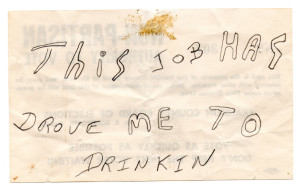You have no items in your cart. Want to get some nice things?
Go shopping
Britain is known for its drinking culture, its pub tradition of drinking until you can barely stand. A report by the World Health Organisation placed England as the 13th highest country for heavy drinking. For such a small country, it’s a very high ranking and a frightening statistic, but I doubt it comes as a surprise. It should be rare to see people intoxicated to the state where they are physically unable to walk, think independently, act responsibly. Yet this is every Friday night in England, maybe every night even. Do people drink so much due to stress? Pressure? To lose inhibition? Or is it habit?
After a long day at work, many retreat to the warmth of their local pub for a few pints of their local ale. The pub is a second home for many, a place to unwind with friends and quite literally drown sorrows. A seemingly innocent place to socialise, pubs have become a British stereotype for drunkenness, an internationally known location for brawls and inebriated behaviour. Turning to a drink at the end of the day fails to help issues, and if anything it hinders any chance of helping ourselves, but the stigma surrounding mental illness and addiction in England has led to us turning a blind eye on drinking problems. We are quietly aware of the issue, yet unable to alter views and make changes. It seems impossible, laughable even, to go for only one drink at the pub; there has to be the end goal of getting wasted. Drinking leisurely has disappeared, and has been replaced with drinking dangerously.
University, the symbol of all day every day drunken fun, right? For many, being drunk is a fantastic thing to boast about. Hearing countless comments such as, “I was so wasted last night, can’t remember a thing,” tires after a while, but are repeated weekly. Many feel the pressure to drink in excess, and so succumb to the drunken cooing pleads of their flatmates to drink that night, only to wish they had woken to the cooing sounds of their mum the morning after as they stumble into the bathroom. The idea of being sober is too daunting, too intense. The phrase “I don’t drink” is rarely spoken, and when heard is treated with confusion, revulsion and questioning. To not buy in to this drinking culture is to not buy in to being a student, an Englishman. Some go to university for the ‘student experience’ instead of the academia. Often the focus is on drinking in order to enjoy yourself. As I have heard many times, you definitely can’t go to a club and have a good time sober. I was recently in a club where the dj shouted ‘Put your hands up if you’re an alcoholic.’ I scoffed, baffled at the audacity of his immoral behaviour, until I saw the hands of everyone around me shoot up, while they jumped and screamed. Yay for alcoholism! Really? Is this what we should be aspiring to? Alcoholism is not something that should be glorified or glamorised, yet it is the dangerous truth for many in England. The focus of having a good time is drinking. It’s not about enjoying yourself, it is about getting drunk. Drinking is a competition – who can drink the most? Who can get drunk the quickest? Who is the first to vomit? Pick me, pick me! Does anyone truly enjoy this?
Self-confidence is an ongoing issue in drinking. The face many put on is merely for show, and relays a deeper issue of wanting to belong and to be accepted. We are taught to be polite, reserved, to be courteous. But does this get us anywhere when meeting people? Plucking up the courage to talk to a stranger means downing a few drinks and stumbling towards the person with a frightened grin on half of your face. To lose your inhibition means to become fearless, to become a different person. The idea of not being your awkward, polite self when drunk is appealing. Maybe you’re a nicer person when you’re drunk. There is something exciting about being able to talk to whomever you like, with the excuse of being drunk to fall back on if it doesn’t quite work out. Drinking is an excuse for doing things you wouldn’t normally do, for doing whatever you want and often not facing consequences.
Laws and legislation do little to Britain’s drinking ego. Recent attempts to introduce a night-time ‘café culture’ in universities, from what I gather, has been rejected and shunned by many students. From the age of 15 we wait with great anticipation until we are 18 and can legally drink. Being able to vote doesn’t get nearly as much excitement. It is thrilling to feel different to usual. This pressure to do something everyone does, the pressing desire to belong, is too much to counter-act the lure of drinking like everyone else. It is so easy to fall into this dangerous cycle of loss of inhibition and self control. It is only when we learn to respect ourselves and our own decisions that this cycle is broken, and we are able to face the problem.
The idea of a more sober Britain is fascinating. What would people do? Would the pub culture die down? Or would an evening café culture arise? What about clubbing? Would people still want to dance without the absence of their reserve? Perhaps there would be more time for talking, more time for thinking. But then again, perhaps there would be less socialising, less conversation. It’s impossible to judge. We are creatures of habit, and two of our damaging habits are drinking and conforming. Perhaps we would revert to nightly tea drinking. It’s a nice thought.

About Isabel Gonzalez-Prendergast
Isabel is particularly interested in international literature, learning about different cultures and philosophies.



